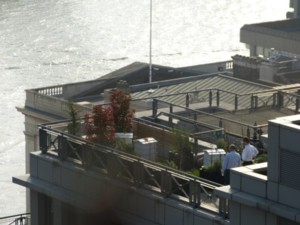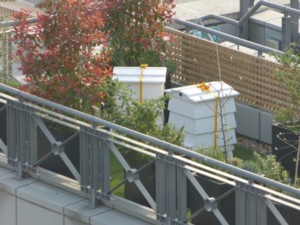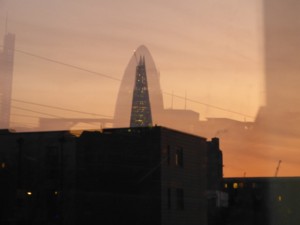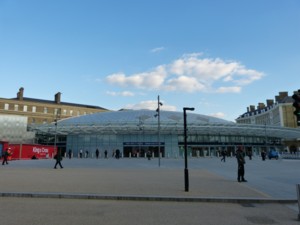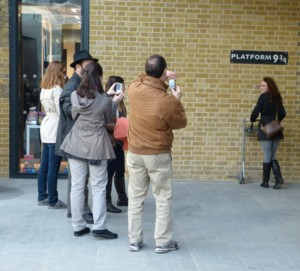We are developing the social individualist meta-context for the future. From the very serious to the extremely frivolous... lets see what is on the mind of the Samizdata people.
Samizdata, derived from Samizdat /n. - a system of clandestine publication of banned literature in the USSR [Russ.,= self-publishing house]
|
Incoming: another of those emails that I get from being on the Cobden Centre insider list that surely won’t mind being reproduced here, this one being from Tom Clougherty:
City AM asked me to make the case for gold in 140-words, for this morning’s comment pages. Not an easy task, but I’m fairly pleased with how it came out.
I’m off out now, and will read this later, but Clougherty’s a good man and I’m sure I’ll like it.
Blog and learn. I just found out that he has his own blog.
Picture of a younger Clougherty (with friends) here.
Last week I attended that Libertarian Home meeting that I mentioned here, addressed by Tom Burroughes, concerning intellectual property. (Pictures of it, and an outside view of the venue, here.)
I agree with Tom Burroughes about intellectual property. In his talk he sat – learnedly, naming and summarising lots of useful luminaries on both sides of it – on the fence. So do I. When it comes to theism, I am an atheist rather than an agnostic. But concerning IP my agnosticism is as strident as the theism and the atheism, so to speak, of all the other contending parties in this ongoing debate. I think IP has to exist if modern life is to flourish, and will emerge from the contracts people make if by no other means. But, I understand the objections to the various forms of IP that come in such abundance from those who disapprove, not least the fact that so much of IP enforcement seems to depend on the state chucking its weight around. IP needs to exist, but it also needs to be treated with suspicion.
I won’t say any more about IP than that. When I later emailed Simon Gibbs about what a good meeting I thought he had arranged and compered, adding that I hoped some time soon to be writing something to that effect for Samizdata, he suggested I might want to wait for the video. When it comes to us all arguing about what Tom Burroughes said about IP, that probably makes sense. But I also want to elaborate a bit about what a good meeting it was, as a distinct point. My basic point being that it really was very good. → Continue reading: The Libertarian Home meeting last Thursday and the difference that a speaker makes
Indeed. I’m watching it on telly now. Someone, a youngish man by the look of him, swam across the course, in front of the boats, and both boats had to stop. They will have a restart, at the approximate point where the race was interrupted. Which will turn the event into two sprints laid end to end, instead of something more like a middle distance event.
The commentators are saying that it was some kind of demo. They are now showing the bloke narrowly missing being decapitated by the oars of one of the boats. It seemed like a very deliberate disruption. They are calling him “a protester”, and they are now reporting that he “has a big smile on his face”, and that he has clearly accomplished what he wanted.
So what do you suppose he was on about? Any bets? Maybe in times gone by, the message being pushed by this demo, if message there was, could have been entirely suppressed by the powers that be, in the event that they wanted it suppressed. These days, no chance.
This is not something that usually happens in the Boat Race. (Yes, yes, there are indeed many other boat races. This one is the Boat Race.) “This has never happened before in the Boat Race”, says an expert talking head.
The race will soon start again. At the time the race was interrupted, the two boats were both very close together. Oxford were apparently heavy favourites at the start. Now, not so much. It was turning into a very good race. How will this affect the result, and be judged to have affected it?
The Boat Race is usually, frankly, a very dull affair, or so I think. Often the race is won and lost within the first half a minute, and the rest of it is a tedious procession. This kind of thing livens it up, in many eyes.
But best of all is when the finish is, as is extremely rare, very close. This one could still end like that, but it’s very unlikely.
I see that in that earlier piece, dated 2003, I wrote this:
I overheard another interesting titbit in among the preparatory waffling. Apparently 90% of these oarsmen go into “banking”, by which I think they meant “merchant” banking. I don’t know what this proves. It could be that rowing is a fine preparation for financial titans. Or it could be that the financial services industry contains a lot of people with more ex-brawn than current brain. A bit of both, I should guess. They don’t get paid anything to be in this race, but it seems that they clean up afterwards. Investment in networking. Speculate to accumulate. Apparently they were racing for the “Aberdeen Asset Management Trophy”. It figures.
So this latest little drama is the kind of thing that Instapundit flags up under the heading of: “metaphor alert”.
And: they’re off!
Again.
Oh my god! An Oxford rower has lost the whole end of his oar. It’s just a stick! The race continues, because the umpire reckons it was Oxford’s fault, following a clash of oars. It’s a procession. Another metaphor alert! The sure fire winner is now doomed!
If you care, this is all terrible. But for me it’s more a case of LOL. Whether that’s right is an argument, but that, for me, is how it was.
This comment, from “James R”, made me laugh, in fact it made me LOL:
We need to avoid conflagrating copyright with patents.
If enough people say that confragrating conflagrating and conflating mean the same thing, then they do. But, I hope that isn’t what gets decided.
This comment was attached to a piece by Tom Burroughes about intellectual property, about which Tom will be speaking, at an event organised by Libertarian Home this evening, in Southwark. I hope to be there myself.
LATER: Oh dear. Another correction is required. The piece I linked to is not by tonight’s speaker Tom Burroughes, but by Libertarian Home’s Simon Gibbs. Apologies to both persons.
Last week I took a trip up to the top of the Monument, which is a memorial to those who died in the Great Fire of London. I of course took lots of photos. And in a posting on my personal blog (now revived from recent hibernation), I also had a moan about the new wire netting that they have installed at the top of the Monument, in place of the old, more digital camera friendly, prison bars that used to be there.
Here is one of the snaps I snapped that day, featuring this new wire netting:
Now, it so happens that earlier last week, the night before my trip to the Monument, I also watched a TV show about bees. Most of it was about African bees migrating across the Savannah, with lots of lurid close-ups of bees looking like alien monsters. But, as this lady explains, at the end of this show they bolted on a short and quite different segment about how bee keeping, waning in the British countryside in the face of mechanised agriculture and pesticides, is now on the rise in the big city. It was like two entirely separate shows. Very peculiar. Luckily for me, I found both shows interesting.
Anyway, take a look through the centre hole in the photo above. What do you see? I’ll tell you what you see. You see beehives. Here’s a closer look at them:
And at two of them even closer:
The first of those three beehive snaps was taken by mistake, as it were. As in: I only realised that bee hives were involved in it when I got home. But, provoked by having watched that TV bee show, I photoed the two subsequent bee hive snaps on purpose.
The anti-technological-progress, anti-capitalist take on this story is that technological progress, capitalism etc. is making life hell for bees in the countryside. And for the time being, technological progress stroke capitalism is indeed turning the countryside from bee heaven into something rather less bee hospitable, although it may soon work out how to refrain from doing this and how to switch the countryside back to being bee heaven again.
Meanwhile, cities like London, with all their gardens full of varied flowers, are becoming new bee heavens.
The thing I learned from the Beaconsfield by-election was that wars make Prime Ministers popular.
– Tony Blair, quoted by Max Hastings in a BBC television programme this evening about the Falklands War and its impact upon subsequent British military policy. The by-election in question happened during that war, and was a landslide victory for Margaret Thatcher’s Conservatives, and Tony Blair’s only electoral reverse.
Have any of us mentioned here that Friedrich Hayek died exactly twenty years plus one week ago, i.e. on Friday March 23rd 1992? I believe not.
Sam Bowman, in a posting on March 23rd 2012, ensured that the ASI Blog was responsible for no such omission. He marked the occasion with a couple of Hayek quotes, from The Constitution of Liberty.
I particularly liked the second one:
It is because freedom means the renunciation of direct control of individual efforts that a free society can make use of so much more knowledge than the mind of the wisest ruler could comprehend.
One of the contrasts in the contemporary world that I keep banging on about here is how different the designing and making of high tech gadgetry (which still benefits – and almost miraculously so – from exactly the sort of dispersed knowledge and dispersed intelligence that Hayek was talking about) is from the management of the world’s financial system (the higher reaches of which are notorious for depending on the good judgement of a tiny few supposedly wise but actually all too fallible political appointees).
As Sam Bowman said, a week ago:
Hayek died twenty years ago today. His profound insights into economics and social philosophy might be more important than ever.
Indeed they might.
Two weeks before the next election, turn off all coal-fired power stations and give the American public a good hard look at their long bleak future.
– commenter “old44” (March 28 5.14am) on a posting at WUWT entitled New EPA rule will block all new coal-electric generation
Things seem to be a bit quiet here this weekend, so here’s a picture I took earlier this evening:
Click to get it bigger.
This is not Photoshopped. That’s exactly what came out of my camera when I got home.
What it is is a picture of the Shard, taken by me from the front seat of a D(ocklands) L(ight) R(ailway) automated train, as the train approached its central London terminus, which is near to the Tower of London.
Taking photos through train windows is, as all photographers know, fraught with peril, because of all those stupid reflections in the glass of the window that you inevitably get, of such things as lights inside the train. But this time, what was reflected in the window was a tower on the other side of the train, namely the Gherkin. And since the train was going very slowly at the time, I was able to line the two towers up with each other.
Well, I like it.
Last year, physicists discovered that red wine can turn certain materials into superconductors. Now they’ve found that Beaujolais works best and think they know why.
– The Physics arXiv Blog (with thanks to the ever alert Instapundit – how does he keep doing it?)
As noted here, first there was this. Now there is this.
Delingpole quotes Aussie blogger Jo Nova at length, and also Detlev Schlichter, thereby also giving another plug to the Cobden Centre, and mentions that meeting at the House of Commons where Schlichter spoke.
The Jo Nova quote ends thus:
If real people had to earn real money, investment bankers would need to make real decisions, scientists would have to find real evidence, and politicians would have to come up with real reasons.
To which Delingpole adds:
Exactly, Jo. Welcome to the Austrian School – the only economic education worth having right now.
Is the parallel between climate “science” and economic “science”, or between climate skepticism and the Austrian school, that exact? Details. I said in my posting earlier that if Delingpole did decide to take all this paper money stuff seriously, it might really be something. He clearly has and it truly might.
Last week, I read somewhere on the www that the new Kings Cross Station passenger concourse would be open to the general public for the first time on the following Monday, i.e. yesterday. When I got there yesterday afternoon, it was certainly functioning like a regular station concourse. It didn’t feel like it had only been open for a few hours, but then again it’s not as if an entire railway station opened, from nothing. This was a case merely of lots of people already using the approximate same place no longer having to thread their way through temporary arrangements, but instead having the pleasure of walking through this:
As you can see from my picture, I wasn’t the only photographer snapping away, and trust me, she and I were two of many. So maybe this really was the first public day of this new piece of London show-off modernity? The www confirmed it.
I knew roughly what this concourse was going to look like, having seen plenty of images of what the architects hoped it would look like, and, more recently, some photos taken by officially selected snappers before the rest of us were allowed in. But until you actually see things like this in the flesh, so to speak, you never really know what you think of them.
I was most agreeably surprised. Kings Cross, having been for the last decade put severely in the shade by the magnificently reborn St Pancras Railway Station, literally only a few dozen yards away, wasevidently making a huge effort to respond to that new Eurostar Palace. But I had feared something like one of those seemed-cool-but-actually-rather-naff, seventies, “designed” (as in: over-designed) pieces of lighting equipment. Not quite lava lamp, but in that kind of territory. I feared that the place would simply not be big enough to justify all that virtuoso metal patterning.
The reason I thought it would be too small for all that designer steelwork is that I had quite often walked past the outside of it, while they were building it. I photoed it again from the outside yesterday, and compared to how it looks inside, it appears from the outside to be tiny:
I say that St Pancras has upstaged Kings Cross for the last decade, but there are many who would contest this. St Pancras may have been awarded the Eurostar trains, but Kings Cross has … the Hogwart’s Express. Many of those visiting the new concourse gave no thought to its ceiling. They just wanted to have themselves photoed next to this sign:
I have a vague recollection of the real entrance to Platform 9¾ being in one of the old brick arches between Platforms 9 and 10, and an even vaguer recollection of waiting on Platform 10 for a train, and seeing some Pottermaniacs cavorting in front of this entrance. If that’s right, the sign I photoed yesterday is a fake. A fake, I tell you.
I guess they figure that the platform ticket business they might be doing is not worth all the bother.
|
Who Are We? The Samizdata people are a bunch of sinister and heavily armed globalist illuminati who seek to infect the entire world with the values of personal liberty and several property. Amongst our many crimes is a sense of humour and the intermittent use of British spelling.
We are also a varied group made up of social individualists, classical liberals, whigs, libertarians, extropians, futurists, ‘Porcupines’, Karl Popper fetishists, recovering neo-conservatives, crazed Ayn Rand worshipers, over-caffeinated Virginia Postrel devotees, witty Frédéric Bastiat wannabes, cypherpunks, minarchists, kritarchists and wild-eyed anarcho-capitalists from Britain, North America, Australia and Europe.
|

